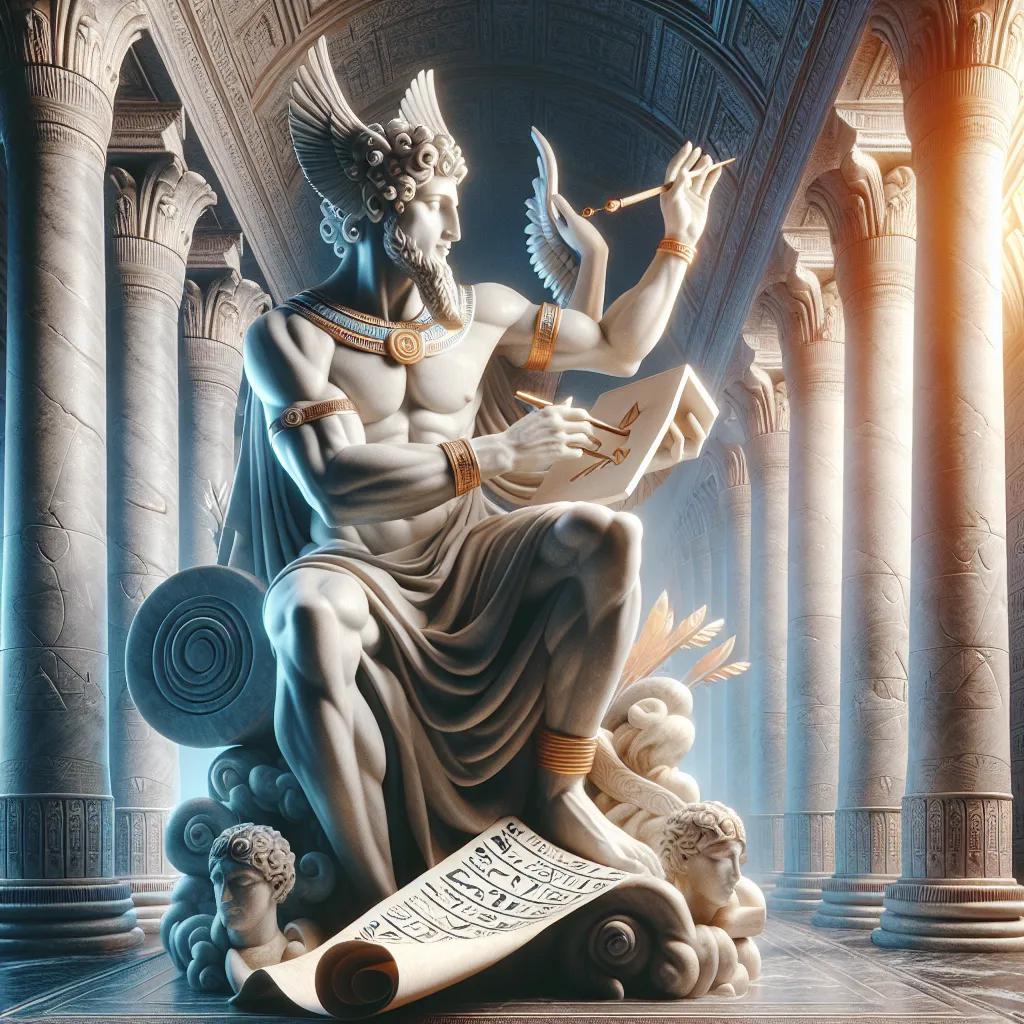
- Published on
- Authors

- Name
- You
Thoth: The God of Wisdom and Writing in Ancient Egypt
In the pantheon of ancient Egyptian gods, few deities are as intriguing and multifaceted as Thoth. Known as the god of wisdom, writing, and knowledge, Thoths influence extends far beyond ancient Egypt. He is credited with the invention of hieroglyphs, the systemization of time, and the maintenance of cosmic balance. This article explores his origins, roles, and enduring legacy.
Origins and Depictions of Thoth
Thoth, or Djehuty in ancient Egyptian, is typically depicted with the head of an ibis or as a baboon, both animals sacred to him. His association with the moon, a celestial body tied to measurement and recording, reinforces his role as a deity of knowledge and order.
Thoth in Mythology
Thoth played a critical role in various mythological narratives:
| Mythology | Role of Thoth |
|---|---|
| The Osiris Myth | Assisted in the resurrection of Osiris and the birth of Horus. |
| The Book of the Dead | Acted as the scribe during the judgment of the deceased. |
| Hermopolis Creation Myth | As a primeval creator, he brought the universe into existence through the spoken word. |
The Wisdom Keeper and Scribe of the Gods
Thoth is often called the "scribe of the gods" or the "lord of divine words." He presided over all forms of written language, bureaucratic documentation, and even magical texts. His contributions to civilization are myriad, encompassing literature, law, philosophy, astronomy, and mathematics.
Hieroglyphs: The Sacred Writing System
Hieroglyphs, the complex and symbolic script, are integral to understanding ancient Egyptian culture and religion. Thoth is credited with not only creating this script but also teaching it to humanity. This writing system allowed for the recording of religious texts, historical events, and everyday transactions.
The Science Behind Hieroglyphs
- Pictograms: Represent tangible objects.
- Ideograms: Symbolize abstract ideas.
- Phonograms: Indicate sounds or syllables.
Thoth and the Calendar
Thoths link to the measurement of time is evident in the Egyptian calendar, which balanced lunar and solar cycles. He orchestrated the creation of the 365-day calendar by adding five epagomenal days, on which the births of several significant deities, including Osiris and Horus, were celebrated.
Thoths Esoteric Legacy
Thoths influence is not confined to ancient history; he has a profound impact on various esoteric traditions. The Hermetic tradition, for example, draws heavily on the wisdom attributed to Thoth, known in that context as Hermes Trismegistus.
Thoth and Hermeticism
Hermeticism, a religious and philosophical system, appropriates the wisdom of Thoth and merges it with Greek and later Christian thought. This tradition emphasizes the pursuit of gnosis (knowledge) and the apprehension of the divine through spiritual practices and alchemical processes.
Key Hermetic Principles
| Principle | Description |
|---|---|
| Mentalism | The idea that "The All is Mind" and the universe is a mental creation. |
| Correspondence | The principle of "As above, so below" illustrating the interconnectedness of all things. |
| Vibration | Everything moves; nothing rests. Understanding vibration aids in spiritual ascendance. |
The Enduring Significance of Thoth
The legacy of Thoth endures in both scholarly and mystical realms. Academic fields of Egyptology, linguistics, and history continue to uncover his historical contributions, while modern spiritual practitioners invoke his wisdom in meditative and magically oriented practices.
Conclusion
Thoth is a luminary figure, embodying the convergence of wisdom, writing, and the cosmic order. His mythological narratives, contributions to human civilization, and esoteric legacy provide a profound testament to his enduring significance. Whether through academic study or spiritual devotion, Thoth remains a beacon of enlightenment and an eternal guide in the quest for knowledge.
By blending scientific inquiry with mystical wisdom, this exploration of Thoth offers a captivating glimpse into the rich tapestry of ancient Egyptian mythology and its lasting impact on human culture and spirituality.
